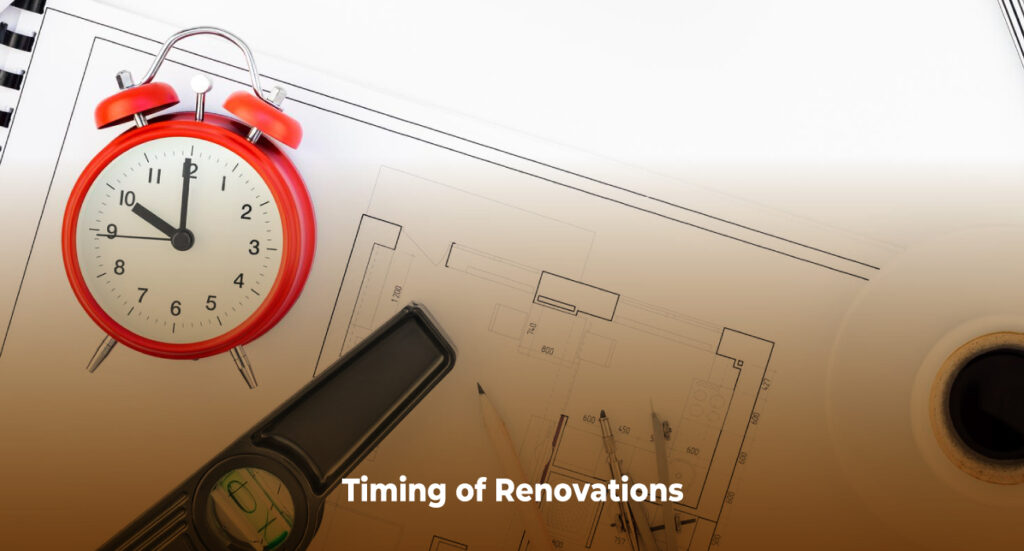7 Essential Property Renovation Tax Tips for 2024
As we move through 2024, many Australians continue to embrace the hands-on approach to renovation projects, finding both joy and a sense of accomplishment in improving their properties. Renovation in 2024 isn’t just about personal satisfaction; it’s also a smart investment strategy. By upgrading their properties, investors can attract higher rents and increase the overall value of their investments, leading to better capital appreciation over time.

Recently, I spoke with a tax lawyer who, despite being able to afford a builder, chose to take time off work this year to personally renovate his investment property. For him, it wasn’t just about saving money; it was a way to reconnect with his childhood memories of working on projects with his father, who was a carpenter. During the month-long renovation, the property wasn’t available for rent, which underscores the important tax implications of such projects in 2024.
In this article, we’ll explore some of the latest tips for property renovation in 2024, helping investors easily identify what needs to be done from a tax perspective when tackling their renovation projects. Understanding these aspects will ensure that you not only enhance your property but also maximize your financial benefits in the current year.

1. Avoid Cash Payments to Tradespeople
- Tip: While some property investors may be tempted to accept incentives or reduced prices from tradespeople in exchange for cash payments, this is a risky practice with serious consequences. Not only can it lead to unfavourable tax outcomes, but it also puts you at a significant disadvantage if something goes wrong.
First, from a taxation perspective, the ATO (Australian Taxation Office) is strict about disallowing expense claims that cannot be properly substantiated. Even if the expense is genuine, paying in cash without obtaining an official invoice or receipt means you cannot claim the tax deduction. The ATO requires proper documentation to verify any claims you make, and without it, you could face penalties or disallowed deductions.
Second, if any damage occurs during or after the work, the tradesperson may refuse to take responsibility for repairs, leaving you with no legal recourse. Furthermore, if you’ve engaged a tradesperson on a cash basis and something goes wrong, your insurance—or the tradesperson’s insurance—might not cover the damage, as there would be no official record of the engagement. This could lead to significant out-of-pocket expenses and potential legal issues. - Important Note: To protect yourself and your investment, always insist on a proper invoice or receipt for any work done and avoid cash payments. This ensures that your expenses are legally compliant and that you are covered in the event of any disputes or damage.
2. Claiming Deductions During Renovations
- Tip: Typically, a property must be available for rent to claim ongoing costs as tax deductions. However, if your property is temporarily uninhabitable due to repairs or renovations, you may still be eligible to claim deductions for certain costs, such as council rates and mortgage interest, even if the property is not generating rental income during this period.
To qualify for these deductions, two key conditions must be met:
- Reasonable Timeframe: The repair or renovation work should be completed within a reasonable period to maintain eligibility for these deductions.
- Prior Availability for Rent: The property must have been rented out or made available for rent immediately before it was damaged or required renovation.
- Reasonable Timeframe: The repair or renovation work should be completed within a reasonable period to maintain eligibility for these deductions.
- Important Note: You cannot claim a deduction for your own Labour during renovations, even if you are carrying out the work yourself.

3. Timing of Renovations
- Tip: The timing of your renovation can significantly impact your tax deductions. Renovations carried out before renting the property are generally considered capital improvements, even if they involve simple repairs and maintenance tasks like fixing plumbing or doing internal paintwork. However, if these repairs and maintenance are performed while the property is rented out, they might be eligible for immediate tax deductions.
For example, suppose you purchase a property that is vacant after the settlement date. You decide to complete some touch-up jobs to prepare it for the tenant. Unfortunately, these expenses are not tax-deductible because the initial repairs made before the property is rented are classified as capital expenses. - Important Note: Renovating before renting might delay your rental income and reduce your ability to claim immediate deductions, impacting cash flow.
4. Capital vs. Deductible Expenses
- Tip: Renovations can involve various tasks, some of which may be classified as capital improvements while others may be considered repairs and maintenance. Understanding the difference between capital improvements and repairs/maintenance is crucial. Capital improvements, such as adding a new room or renovating the kitchen, are not immediately tax-deductible. Instead, these costs are added to the property’s cost base and can impact Capital Gains Tax (CGT) when the property is sold. In contrast, repairs and maintenance (like fixing a broken window or painting internal walls) can be deducted in the year they are incurred if the property is already being rented out.
- Important Note: Misclassifying expenses can lead to incorrect tax claims, potentially resulting in penalties or missed deductions.
5. Depreciation Benefits
- Tip: Consider the potential depreciation benefits of the renovation. Assets like new appliances, carpets, or hot water systems can be depreciated over their effective life, providing tax deductions over several years. If you are undertaking a large renovation, engaging a qualified quantity surveyor to prepare a tax depreciation schedule can help maximize these benefits.
It’s important to be mindful that if the owner decides to live in the property as their primary residence after the renovation, even for a short period, it will eliminate their ability to claim plant and equipment depreciation. - Important Note: Failing to account for depreciation properly can result in missed deductions and a higher tax bill.

6. Impact on Capital Gains Tax (CGT)
- Tip: Renovations that add value to the property can increase the cost base, which may reduce the CGT liability when you eventually sell the property. Keeping detailed records of all renovation expenses is crucial for accurately calculating CGT.
- Important Note: Incorrectly recording or losing records of renovation costs can lead to an inflated CGT liability.
7. Understanding the Impact of GST on Renovations
- Tip: Generally, residential properties are exempt from GST, meaning property investors cannot claim any GST credits when renovating a residential investment property. However, the situation changes if you are undertaking substantial renovations that significantly alter the property’s characteristics and if the renovation is being done for business purposes. In such cases, the property may be considered a new residential property, which could attract GST on the sale and allow you to claim GST credits on renovation expenses.
- Important Note: GST rules can be complex; consult with a tax professional before undertaking substantial renovations to understand your GST obligations and opportunities.
Renovating an investment property in 2024 offers numerous benefits, from attracting higher rental income to boosting the property’s overall value. However, as we’ve discussed in this article, navigating the tax implications of these renovations is crucial for maximising your financial returns. Whether it’s understanding the impact of timing, differentiating between capital improvements and deductible expenses, or knowing when GST comes into play, being informed can help you avoid costly mistakes.
For personalised advice tailored to your specific situation, consider reaching out to Investax’s property tax specialists. Our experts can guide you through the complexities of property renovation, ensuring that you make the most of your investment while staying compliant with the latest tax regulations.
General Advice Warning
The material on this page and on this website has been prepared for general information purposes only and not as specific advice to any particular person. Any advice contained on this page and on this website is General Advice and does not take into account any person’s particular investment objectives, financial situation and particular needs.
Before making an investment decision based on this advice you should consider, with or without the assistance of a securities adviser, whether it is appropriate to your particular investment needs, objectives and financial circumstances. In addition, the examples provided on this page and on this website are for illustrative purposes only.Although every effort has been made to verify the accuracy of the information contained on this page and on our website, Investax Group, its officers, representatives, employees and agents disclaim all liability [except for any liability which by law cannot be excluded), for any error, inaccuracy in, or omission from the information contained in this website or any loss or damage suffered by any person directly or indirectly through relying on this information.
Reference
ATO – Initial Repair





